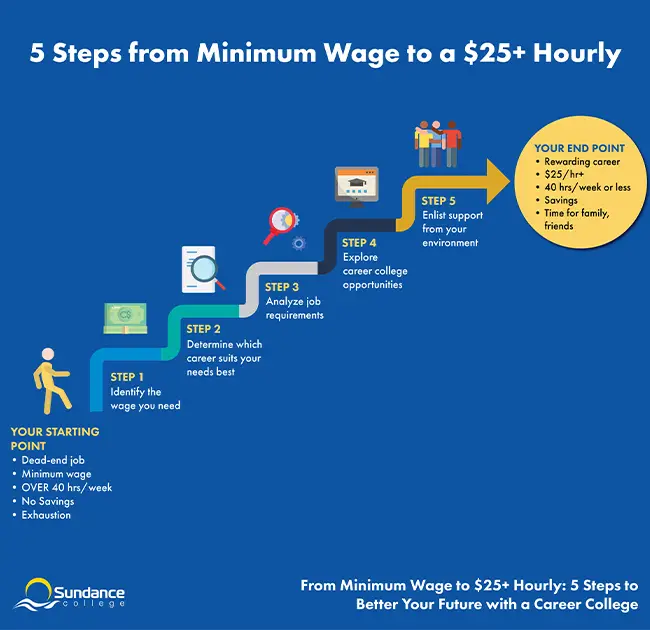Blog / From Minimum Wage to $25+ Hourly: 5 Steps to Better Your Future with a Career College
From Minimum Wage to $25+ Hourly: 5 Steps to Better Your Future with a Career College

Explore our Diploma Programs
- Business, Hospitality, and Legal
- Health and Human Services
- Technology
Table of Contents
“Ugh, that alarm again,” Kristine groaned as the loud noise filled the room at 5:30 a.m. Kristine’s 4-year-old daughter, Lily, was still sleeping carelessly under the blanket. “I need my coffee first. Then, Lily’s lunch.” Kristine’s morning routine was in full swing. “What? Lily! We only have 5 minutes to get dressed,” Emily shouted in a hurry when the clock showed 6:30.
After dropping Lily off at daycare, Kristine rushed to her job at the fast-food restaurant. The morning shift was in full swing, with orders piling up. A notification buzzed on Kristine’s phone. “Oh, my $920 paycheck. Now I can pay the rent. Next week, another paycheck of around $650 from my weekend job should come. So, I can pay for the internet, phone, and electricity bill, as well as buy some food for the week. And daycare fees… Well, hopefully, they can wait until the end of the month.”
Late that night, Kristine lay awake, frustrated and worried. Despite working 60 hours a week for two years, she still struggled financially to meet their basic needs. She yearned for a higher-paying job but didn’t know how to make it happen.
Recent reports suggest that Kristine isn’t alone. Many people across Canada who earn minimum wage struggle to afford rent, leaving little left for other bills and expenses.
If you’re wondering how to escape your survival job and get a better life for yourself and your children – there is a solution. Through career college education, you can break free from this cycle, step into better career development pathways, and start to earn more within months, not years! Keep reading to find out 5 steps to escape the low-wage trap and secure the future you deserve.

Step 1: Identify the Wage You Need
What’s the magic number that can liberate you from the minimum-wage grind and bring stability to your life? Your specific needs depend on factors like where you live, your family size, and your spending habits. For instance, if you’re in Toronto, you might need at least $33.62 per hour to cover a one-bedroom apartment and living expenses. But in Winnipeg, $20.42 could suffice.
Take a moment to create a budget and pinpoint the wage that’ll provide financial freedom. Once you’ve determined your target, begin exploring careers that offer this hourly rate from entry-level positions.
Step 2: Determine Which Career Change Options Suit You Best

What if you could turn your strengths and passions into a well-paying career? Your unique skills and interests hold the key. If you like working with numbers, consider roles in accounting, tax, and payroll. Love problem-solving? Dive into supply chain management. Looking for an opportunity to help others? Explore health and social services.
To help you determine what career best fits your interests, take our free career quiz.
Now, match your interests and abilities with well-paying jobs. Here are 5 easy-to-enter, well-paying positions:
- Outreach Worker – $25.04 per hour
- Payroll Administrator – $25.66 per hour
- Marketing Specialist – $29.03 per hour
- Supply Chain Manager – $30.50 per hour
- Network Administrator – $43.22 per hour
Step 3: Analyze Job Requirements: Education, Skills, Experience
Once you choose the job you want to switch to, a quick look at job ads and employers’ requirements to enter the workforce will show you that, more often than not, one of the main requirements is to have a post-secondary diploma and some relevant experience.
Step 4: Find the Fastest Way to Become Job-Ready
Career college training programs offer the quickest path. They’re often less than a year long. Government-approved programs are eligible for student aid funding which could include grants that don’t have to be paid back. Plus, at some colleges, you can study at your pace, online or on-campus, providing flexibility.
What Are Career Colleges?
What exactly are career colleges? Career colleges are regulated post-secondary institutions that offer outcome-based diploma and certificate programs designed to equip students with career-specific skills.
They prioritize addressing student needs and delivering targeted job-readiness training. They primarily focus on areas like business and legal, health and social services, and technology.
For example, among the Sundance College program options are:
- Medical Office Administration – 43 weeks, including a 5-week workplace practicum
- Supply Chain Management – 60 weeks, including a 7-week workplace practicum
- Network System Administrator – 48 weeks, including a 5-week workplace practicum
- Addictions and Community Health – 44 weeks, including a 7-week workplace practicum
- Pharmacy Assistant – 43 weeks, including a 7-week workplace practicum
- Professional Legal Assistant – 46 weeks, including a 5-week workplace practicum
- Digital Marketing and Social Media Management – 43 weeks, including a 5-week workplace practicum
This tailored approach ensures that students receive the education and training required to excel in their chosen fields while boosting earning potential.
Benefits Of A Career College As A Way Out Of Minimum Wage

Why choose a career college to escape low-paying jobs? Here are the key benefits to keep in mind:
- Skill-Based Learning: Career colleges prioritize practical skills development that directly apply to your chosen field. You’ll gain hands-on expertise that employers value, setting you up for success in the workforce.
- Fast-Track Options: Many career college programs can be completed in under a year. This accelerated pace means you can start your new career journey with a higher income sooner than you might think.
- Flexible Schedules: Whether you prefer on-campus learning or the convenience of online classes, many career colleges offer flexibility to suit your needs. Typically, career college programs offer options for half-day on-campus classes or learning online at your own pace, enabling you to work while you study and fulfill other commitments.
- Networking Opportunities: Joining a career college opens doors to industry connections. You’ll have the chance to meet professionals in your field, paving the way for valuable contacts and potential job opportunities.
- Practicums, Career Services, Mental Support: Some career colleges, like Sundance College, provide practical work experience through practicums, ensuring you’re job-ready upon graduation. Some of them offer comprehensive career services to assist you in securing employment. In addition to this, Sundance College, for instance, offers 24/7 mental health support to help students manage the challenges of balancing work, life, and education.
How To Choose A Career College?
When it comes to selecting the right career college, here are seven key factors to consider:
- Transparency during the enrollment process
- Availability of approved student loan funding
- Online and on-campus learning modalities
- Resources for student success and well-being
- Practicum training included
- High employment rate for alumni
- Positive Google Reviews
Step 5: Enlist Support from Your Environment
Once you’ve started college to advance your career, will you want to enlist support from your environment to juggle work, life, and studying?
- Family and Friends: Lean on your support network. Discuss your aspirations with family and friends and seek their assistance. Perhaps they can help with childcare, meal preparation, or transportation, giving you more time to focus on your studies.
- Coordinate Responsibilities: Organize responsibilities within your household. Clearly define who will handle various tasks while you’re pursuing your education. A well-structured plan can make a significant difference in managing your time.
- Engage with Your Employer: If you’re currently employed and plan to evolve in this career, consider discussing your goals with your employer. Some companies are supportive of employees seeking further education and may offer flexibility in your work schedule or financial assistance.
- College Resources: Take full advantage of the resources your career college provides, including learning at your own pace. Reach out to instructors and support staff when you have questions or need assistance with your coursework. They are there to help you succeed.
- Tap into Career Services: As you progress through your program, make the most of your college’s career services. These services can help you build a resume, prepare for interviews, and connect with potential employers. Utilizing career services can significantly enhance your job prospects upon graduation.
Remember, balancing work, life, and education is entirely achievable with the right support and resources!
Career Transformation Stories: David M.
Meet David M. David graduated from Sundance College’s Addictions and Community Health Program in 2021. His journey didn’t stop there; it was just the beginning of his real-life career transition, breaking free from minimum wage and transforming his life.
After completing his program, David launched a meaningful career path. For a year following his graduation, he dedicated his time to working as a behavioral support worker in a support home (around $24.75 per hour).
David then took a step forward in his career. He joined a brand-new addiction facility in Drayton Valley, Alberta, where he assumed the role of an Addiction Worker (approximately $26,49 per hour). His responsibilities include case management, program enhancement, and community outreach, making a significant impact on his local community.
David shared his experience with Sundance College in a heartfelt Google Review:
“Sundance College changed my life! Everyone I encountered, from facilitators to fellow students, was always willing to help, and still reach out today! The Addictions & Community Health program has provided me with the knowledge to apply my life experiences to real life. Ultimately helping me to realize my life purpose of creating a healthier and brighter future for not only my community but the world. I will forever be grateful for my experience and cannot thank Sundance enough!”
David’s story is a good example of how career-focused education, diligence, and dedication can help people leave behind survival jobs for a life of purpose and higher income.
Sundance College: Your Gateway to Fulfilling Career Paths

If you’re trapped in a low-wage job like Kristine, consider taking these 5 steps to provide yourself and your family with a future with greater financial stability – and a rewarding career!
Sundance College is here to help equip you with the skills and knowledge employers are looking for – with expedited programs, practical work experience, career services, mental health support – and instructors and staff who will support you every step of your journey with us. And perhaps we will be showcasing your success story one day soon!
Fill in our contact form online to connect with one of our admission advisors about which programs best fit your needs, ways to fund your education, scholarships, our laptop program, and the enrollment process.
Subscribe for more career advice
Blog Categories
Share on:
